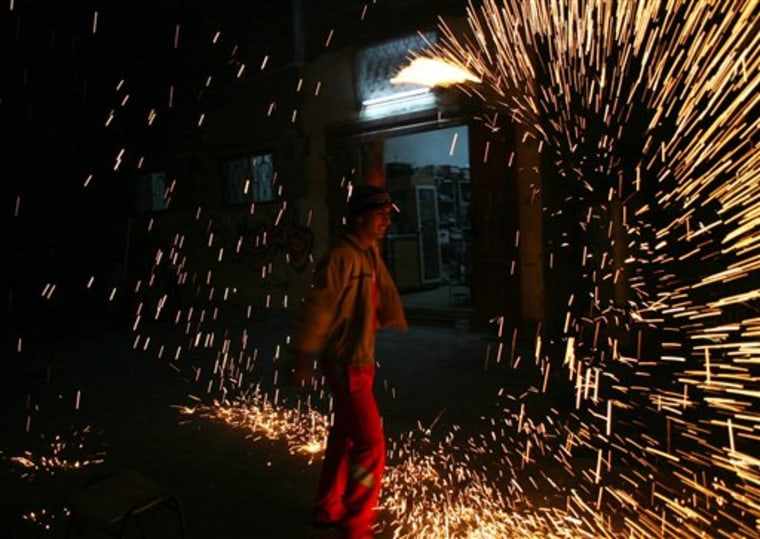At least four Palestinians died late Monday in internal clashes in Gaza, the first casualties from infighting since November, despite a conciliatory speech toward Hamas from President Mahmoud Abbas marking the anniversary of the founding of his Fatah movement.
The sudden spike in internal Palestinian tensions came just a week before the planned visit of U.S. President Bush, who will try to prod Israel and the Palestinians closer to peace. Internal Palestinian violence could make it difficult for Abbas to concentrate on talks with Israel.
Fireworks lit the skies of Gaza after nightfall Monday, and Fatah backers fired rifles in the air all over Gaza, defying a ban on celebrations by the Islamic Hamas rulers of the territory.
In the southern Gaza city of Khan Younis, clashes erupted between Fatah backers and Hamas security forces. Medics said three people were killed, identifying them as two Hamas police officers and a Fatah backer. Another was killed in Gaza City. At least 60 people were wounded.
Hamas banned fireworks and the traditional Fatah parades on Jan. 1, calling the gathering in Khan Younis "illegal."
Hamas said the two officers were shot by Fatah gunmen on rooftops there. Fatah said Hamas forces raided houses and arrested dozens of Fatah members.
First fatalities since Nov. 11
Monday's were the first fatalities in Fatah-Hamas fighting since Nov. 11, when Hamas forces opened fire on a huge Fatah rally in Gaza City, killing eight people and wounding 85. That rally was the biggest show of Fatah strength since Hamas overran Gaza in June, expelling Fatah forces loyal to Abbas.
After the Hamas takeover of Gaza, Abbas expelled Hamas from the government and named his own, which in effect rules only the West Bank. The West restored aid to Abbas and encouraged renewed peace talks with Israel.
At a conference last month in Annapolis, Md., sponsored by Bush, Israeli Prime Minister Ehud Olmert and Abbas pledged to restart negotiations and aim for a peace treaty in 2008.
In an anniversary speech Monday that lasted almost an hour and a half, Abbas offered to talk to Hamas.
"There is no way for any party here to be an alternative to the other, and there is no room for terms like coup or military takeover, but only for dialogue, dialogue, dialogue," he said.
Abbas called for "a new page, writing in its lines a credible agreement based on partnership, on life, on our homeland and our struggle to liberate it."
Abbas maintained his position that Hamas must restore power in Gaza to an elected government. But he urged reconciliation and called for new elections in an effort to end the suffering the Palestinian people have endured as a result of the takeover.
Israel, citing security concerns, sealed its border with Gaza after Hamas wrested power, letting in only humanitarian aid. Ensuing shortages have deepened poverty and unemployment in the already impoverished territory.
"I renew my offer for early elections here, as a way out of the hell that was imposed on us," Abbas said Monday.
Hamas rejects appeal
Hamas spokesman Fawzi Barhoum rejected Abbas' speech. "It is full of incitement and words calling for divisions. There is no new initiative or practical step in this speech that can pave the road to start an immediate dialogue," he said.
Abbas directed some of his comments Monday at Israel. He called on the Israeli government to cease settlement construction and dismantle its separation barrier in the West Bank, saying they "undermine the basis of the independent Palestinian state and block the two-state solution."
He also complained about Israeli army checkpoints in the West Bank. "There are 640 Israeli checkpoints and roadblocks in the West Bank and Israel did not lift or remove any of them," he said.
Also Monday, Israeli Prime Minister Ehud Olmert sent a letter to his Cabinet ministers declaring that any new construction in the West Bank must get his approval. This followed publication of building bids that embarrassed Olmert just before and after the Annapolis conference.
